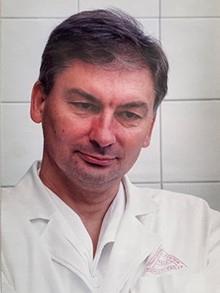This tribute was co-authored by Curtis D. Klaassen.

With deep sadness, we say goodbye to Zoltán (Zoli) Gregus, MD, PhD, DSc, DABT, who was an SOT member for 40 years and recipient of the SOT AstraZeneca International Travel Fellowship in 2002. He was Professor Emeritus with the Department of Pharmacology and Pharmacotherapy, School of Medicine, University of Pécs in Pécs, Hungary. Dr. Gregus unexpectedly passed away at age 73 on July 5, 2022. He is survived by his loving wife, Dr. Éva Sásdi; his two daughters, Éva and Judit; and his four grandchildren.
Dr. Gregus was born on September 30, 1948, in Paks, Hungary, as the son of Dr. Vince Gregus and Julianna Bene. After completing his elementary and high school studies in his hometown, he accomplished his medical studies at the Medical University of Pécs from 1967 to 1973. He was one of the most excellent students in his class.
In 1974, Dr. Gregus joined the laboratory of Professor Dr. Ferenc Varga, who was one of the forerunners of modern Hungarian toxicological research, in the Department of Pharmacology at the Medical University of Pécs. At that time, the laboratory's primary focus was understanding the biliary excretion of organic anions and various hepatoprotective chemicals. From 1978 to 1979, Dr. Gregus worked for three months with Professor Dr. Wolfgang Klinger at Friedrich-Schiller-Universität in Jena, Germany. In collaboration with Prof. Klinger, he studied the role of microsome inducers on the biliary excretion of various bile acids and cholephilic dyes. In Germany, he also became interested in the role of radicals in the toxicological process. In 1980 and 1981, Dr. Gregus spent a year doing research at the University of Kansas with Dr. Curtis D. Klaassen and returned in from 1984 to 1987 to continue these studies. While in Kansas he determined the effects of conjugating enzymes on the biliary excretion of xenobiotics and the distribution and toxicity of metals. This research helped obtain a US-Hungarian Joint Grant from the National Institutes of Health with Dr. Klaassen with funds to be spent in Hungary.
In 1983, Dr. Gregus defended his PhD dissertation, “Factors Influencing the Biliary Excretion of Cholephilic Chemicals.” Ten years later, in 1993, he defended his DSc (Doctor of Hungarian Academy of Sciences) dissertation, “Role of Conjugation Reactions in Excretion of Xenobiotics.” From 1986 to 2016, he was a Diplomate of the American Board of Toxicology.
Because of his extensive knowledge of toxicology, Dr. Gregus was invited to write the chapter “Mechanisms of Toxicology” for the fifth edition (1996) of Casarett & Doull’s Toxicology: The Basic Science of Poisons. This writing required outstanding expertise and a large investment of time. In fact, he came back to Kansas City over numerous summers to write this chapter and to revise it for the next three editions of the book. This chapter has contributed markedly to the education of toxicologists around the world.

Over the years, the laboratory of Dr. Gregus contributed to understanding the role of glutathione in detoxifying xenobiotics, the metabolism of arsenic, and the biotransformation and excretion of various metals and metalloids. His laboratory identified monomethyarsenous acid (MMAsIII)-GS conjugates as the major organic arsenic compound in bile. With classical biochemical and in vivo methodologies, his laboratory also significantly contributed to the understanding the mechanisms of reduction of pentavalent arsenicals.
In 1994, Dr. Gregus established the first independent experimental toxicology PhD program in Hungary at the Medical University of Pécs.
Dr. Gregus also was a maximalist as an educator; he always updated his comprehensive educational materials to the latest advances in science with great precision. He wrote several chapters in various editions of Hungarian pharmacology textbooks. His teaching was not only limited to training medical students in Hungarian and English, but after 2005, he also played a key role in the education of pharmacy students at the University of Pécs. He established toxicology as an obligatory independent course, which was unique among the four Hungarian pharmacy schools. He had a reputation as a strict but fair examiner. The students considered it a real success if they got a good grade from him.
Dr. Gregus’s diligence, sense of duty, and seriousness were outstanding. He was very strict with his colleagues and students but mostly with himself. He was extremely precise, both verbally and in writing. He immediately noticed the unclear parts in the texts and always suggested a straightforward solution. Dr. Gregus took everything seriously and fulfilled the requirements with great care. He was always courteous, polite, and very pleasant. He had a wry sense of humor, with a characteristic smile at the corner of his mouth.
With the passing of Dr. Zoltán Gregus, the community of Hungarian and international toxicologists lost a very knowledgeable researcher and educator. We miss him.
#InMemoriam#Member#Communique:SOTNews